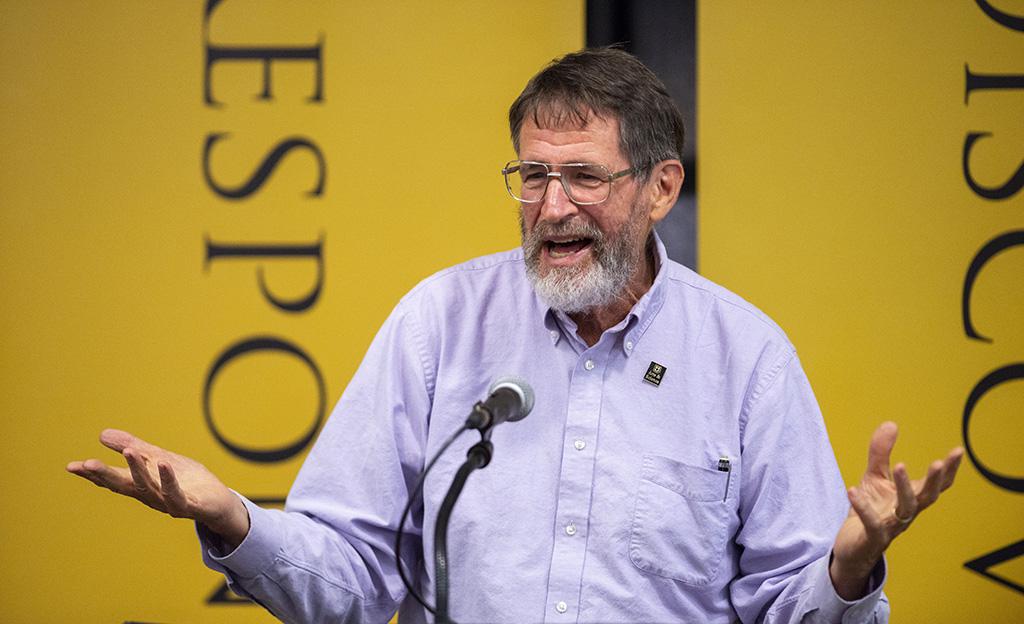The Royal Swedish Academy of Sciences announced this morning that Dr. George Smith, MU Board of Curators Distinguished Professor Emeritus of Biological Sciences, received the 2018 Nobel Prize in chemistry. He was one of a three-member research team who won this award.
Smith is the first MU professor to receive the Nobel Prize.
He received a phone call from Sweden at about 4:30 a.m. today. At first, Smith thought he was being pranked by one of his friends speaking in a fake Swedish accent. However, he soon realized the news was true.
The other two members of the team were Dr. Frances Arnold, professor at the California Institute of Technology, and British biochemist Dr. Gregory Winter.
MU held a press conference to celebrate Smith’s achievement.
“This award, in my opinion, celebrates and validates the impact of basic research, particularly research that is interdisciplinary in its focus,” Patricia Okker, Dean of the College of Arts and Sciences, said.
Okker shared a little about Smith’s research.
“[Smith] is a curious researcher, as all good researchers are,” Okker said. “One of the questions he asked was, ‘What would happen if we applied principles of evolution to the fields of immunology and molecular biology?’ What he came up with was a method called phage display, the applications of which are greater than any one person could have ever imagined.”
Chancellor Alexander Cartwright shared statements of pride regarding Smith’s achievement.
“This [award] reflects on what happens at an institution like this,” Cartwright said. “It’s hard work, it’s the ethics of Mizzou, it is working with our students, sacrificing to be able to work on topics that we are interested in. Sometimes people may question where it’s all leading to. But it’s with breakthroughs like these that you see what can come out of it.”
He expressed gratitude to Smith for his hard work and dedication towards his research.
“It’s impossible to overstate the value of [Smith’s] work on cancer treatment, the development of vaccines, stress fractures in steel and so much more,” Cartwright said. ”Today’s honor comes from Dr. Smith’s development of phage display, and specifically his research focused on producing new antibodies used to cure metastatic cancer and counteract autoimmune disease.”
Smith then explained the theory behind his technique, called phage display.
“Nature is not an engineer,” Smith said. “Nature doesn’t have a clue about how to design anything. Instead, it had this huge collection of living things. They were all in an environment and a few of them developed variations that allowed them to do something that gave them a slight advantage and allowed them to proliferate more than their neighbors. These steps, one at a time, can lead to the evolution of very incredibly complicated machines like the bee or the butterfly.”
He then explained how this theory applied specifically to phage display. Phages, or bacteriophages, are viruses that infect bacteria.
“Phage display is a test tube where we have a large number of entities competing with each other, [In this case] they happen to be phage particles, and you artificially impose a selection on them to favor those things that you want,” Smith said. “[It] is a little bit like trying to put evolution by natural selection in a test tube, very much simplify it and not let natural selection create the pressure on survival. [Instead], the experimenter decides.”
Drugs based on Smith’s research are used to treat conditions like rheumatoid arthritis and psoriasis.
Okker said that this award not only recognizes Smith’s hard work, but also reflects the research in the College of Arts and Sciences.
“This is what we do at Mizzou and in the College of Arts and Sciences,” Okker said. “We ask essential questions about how the world works, and then we apply that basic research to all kinds of real-world problems.”
She is grateful to Smith for his work and passion towards his field of research.
“Thank you for being curious about the world,” Okker said. “Thank you for your decades of work and thank you for sharing that passion for your field with the students at Mizzou.”
_Edited by Morgan Smith | [email protected]_














